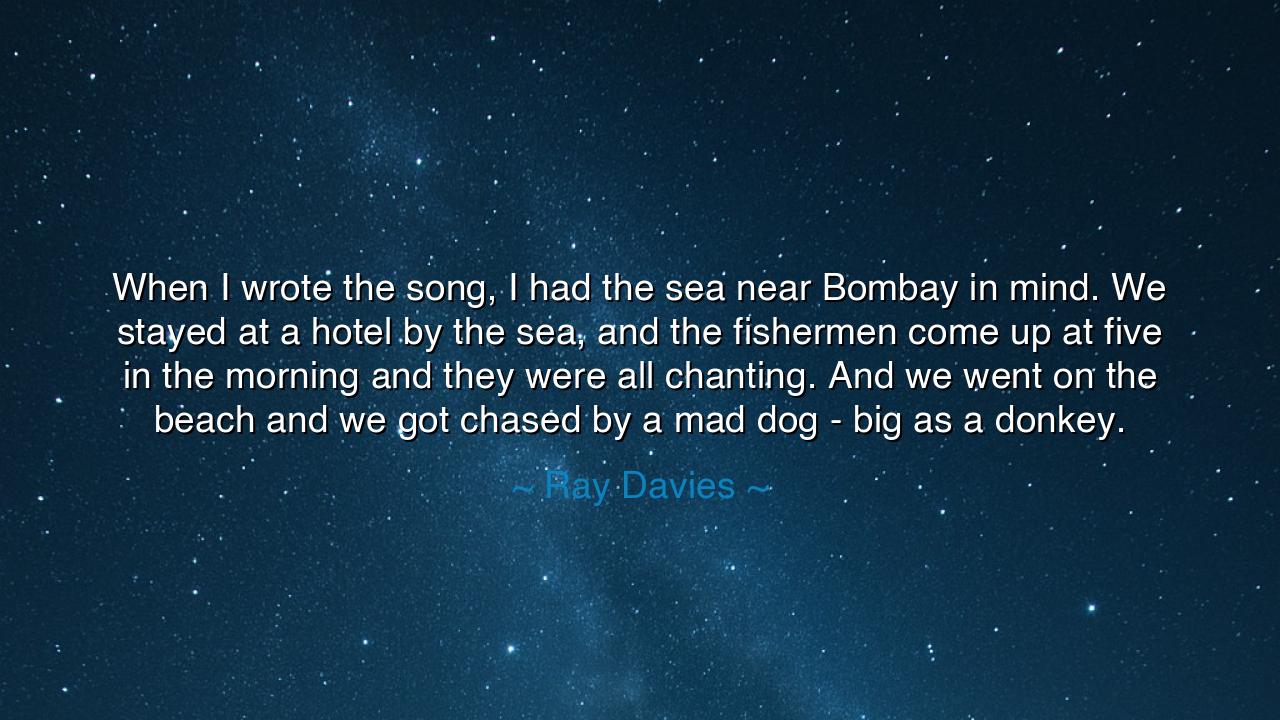
When I wrote the song, I had the sea near Bombay in mind. We
When I wrote the song, I had the sea near Bombay in mind. We stayed at a hotel by the sea, and the fishermen come up at five in the morning and they were all chanting. And we went on the beach and we got chased by a mad dog - big as a donkey.






The words of Ray Davies seem at first a recollection of a strange and lively moment: “When I wrote the song, I had the sea near Bombay in mind. We stayed at a hotel by the sea, and the fishermen come up at five in the morning and they were all chanting. And we went on the beach and we got chased by a mad dog—big as a donkey.” Yet, when heard with the ears of wisdom, this story is more than a memory. It is a parable about inspiration, about the marriage of danger and beauty, and about how creation is often born out of chaos and unpredictability.
He begins with the sea near Bombay, the eternal source of mystery and rhythm. For the sea is both a giver and a taker, a mirror of life itself: restless, unpredictable, endless. The sound of the fishermen chanting at dawn reflects this duality. They labor not in silence, but in song, binding their toil with music, reminding us that human beings transform necessity into art, even in the earliest hours of the morning. Their chants become not only a call to work but a hymn of survival, a reminder that music itself often springs from the labors of ordinary men.
The mad dog upon the beach, enormous as a donkey, bursts into the scene as a symbol of life’s wildness. Just when one is captivated by rhythm and inspiration, the world tests us with fear and unpredictability. Inspiration does not arrive in a polished chamber of silence—it comes amidst fishermen’s cries, the crash of waves, and even the sudden shock of danger. The dog reminds us that creation is not safe. To live, to write, to sing, is to risk being chased, startled, even broken, yet it is from such experiences that the deepest songs emerge.
History echoes this lesson. Homer, when he told of Odysseus, did not set him upon calm shores, but hurled him into storms, monsters, and temptations. Out of these dangers came the epic that still sings across centuries. Similarly, Ray Davies did not birth his song from comfort, but from the mingling of dawn chants, vast seas, and the menace of a beast. Creation, whether in ancient poetry or modern song, is never born in the stillness of safety, but in the clash of wonder and terror.
There is also humility in this story. The great songwriter, whose words reached millions, grounds his inspiration in the chants of fishermen, men who toil unseen by the world. Their voices became part of his art, showing us that greatness is not invented in isolation but gathered like shells upon the shore—from strangers, from nature, from fleeting moments of the unexpected. The artist becomes a vessel, catching fragments of life and weaving them into something lasting.
The lesson, then, is this: do not wait for perfect conditions to create. Do not think inspiration will come only in silence or in comfort. Embrace the noise, the danger, the unpredictability of life, for it is in those very moments that your spirit will be stirred. The fishermen’s chant and the mad dog are both parts of the same truth: the world sings and growls at once, and both sounds are needed to awaken the artist within you.
Therefore, children of the future, walk to the edges of the world—by the sea, in the markets, in the places where men labor, in the moments where danger and beauty collide. Open your heart to all of it. Know that even in the most chaotic dawns, inspiration can strike, and from the mixture of fear and wonder a song, a poem, or a vision may be born.
Thus, Ray Davies’ recollection becomes an eternal teaching: creation is born from the rawness of life itself. The sea will roar, the fishermen will chant, and sometimes the dog will chase—but if you endure, you will carry away not wounds alone, but music that will outlast the chaos.






AAdministratorAdministrator
Welcome, honored guests. Please leave a comment, we will respond soon